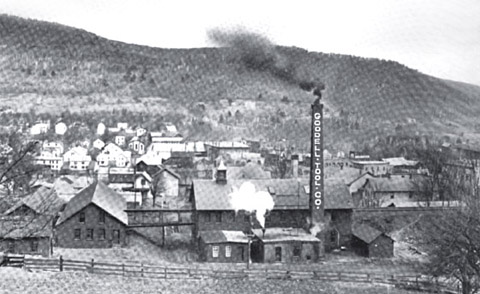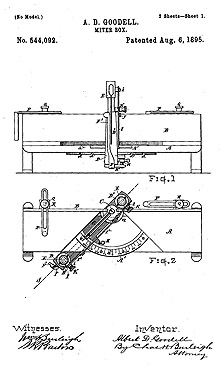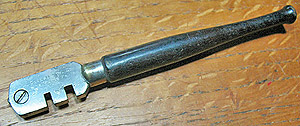In 1912 the Western New England magazine
published a short profile of the company, its new factory and
their manufacturing capabilities:
"Mr. A. D. Goodell, president of the Goodell Tool
Company, has long been an inventor, as well as a practical
mechanic. He has invented and perfected many important
tools some of which were put on the market before 1893 when in a
small way, in company with his son, F. A. Goodell, they started
in business for themselves, renting room and power of the H. H.
Mayhew Company. Mechanics' tools have been specialized on, and a
business built up which compelled them to seek larger quarters
in 1904.
The factory which they then bought of J. R.
Foster stands beside the B. & M. tracks with excellent shipping
facilities. Some forty or fifty men are now employed, and the business
continues to increase. Recently, thoroughly up-to-date
appliances have been added indicating conclusively the attention
the management always pays to keeping abreast of the times.

Since the electric power supply has been
available several motors have been installed to supersede
water wheels. Then, too, individual sanitary wash bowls,
with faucets for both hot and cold water, also individual
steel lockers for clothing, have been supplied. On each
floor of the factory are sanitary, bubble drinking
fountains."
After repairs and adaptations Albert D. settled in the new
factory and immediately plunged into new tools designs. His son, Frederic
A., concentrated on production.(45)
On April 4th, 1907, Albert D. Goodell
incorporated the Goodell Tool Company in Buckland, MA. He
became the president and treasurer and Francis R. Pratt, a
superintendent from a H. H. Mayhew Co., assumed the position of vice-president.(46)
In another source, the following description of
Albert's business said:
"Until his death, one of the Goodells was
actively identified with the Goodell Tool Co., of
Shelburne Falls, in which the Goodell-Pratt Company was a
large owner, and the sale of whose products it controlled."(47)
This description requires a few comments.
It is clear that decision to move back to Shelburne Falls was
rather hasty and Albert D. was ill-prepared.
It looks like he didn't have a place in mind to move into and it
is possible that his financial situation was rather poor.
He turned to an old ally, H. H. Mayhew Company and rented space
there to start his own shop.
H. H. Mayhew Company was a familiar ground
for Albert D. Goodell. When he started Goodell
Brothers with Henry E. in 1888, the Mayhew Co. provided sale
services for the brothers. At the time, the
superintendent of H. H. Mayhew Co. was Francis Roscoe Pratt.
William M. Pratt, his son, was now employed with H. H.
Mayhew Co. as the secretary and was familiar with the Goodell
Brothers' story through his father.
In November, 1894 Albert D. had an opportunity
to establish his own shop and needed capital to do that. I
believe it is at this moment that Francis R. Pratt and William W. Pratt offered to
help in exchange for partial ownership of the business.
The offer seemed to be right and timely and Albert D. accepted
it. The transaction was struck and Albert D. became a
happy owner of his own shop. He could begin his
development and production work.
This was also the first step for William M. Pratt
toward his own business – the Goodell-Pratt Company. The
next step was dealing with Goodell Brothers Co. and Henry
E., but this was still in the, not too distant though, future.
In 1894 or the beginning of 1895 Albert D. began work on
improvements to the miter box - a job contracted by Millers
Falls Co. This was the second time he worked on miter boxes
for Millers Falls Co. The first time was in 1879, when
Albert D. helped
 with
the redesign and improvements in miter boxes,
working together with D. C. Rogers of Langdon Mitre Box Co. This time the application was filed in April, 1895 and
patent
No. 544,092 was issued on August 6, 1895.
with
the redesign and improvements in miter boxes,
working together with D. C. Rogers of Langdon Mitre Box Co. This time the application was filed in April, 1895 and
patent
No. 544,092 was issued on August 6, 1895.
Albert D. was not a stranger to working on
designs or patents for third parties. In 1879, while working
for Millers Falls Co., he developed a Machine for Re-cutting
Wagon Axels, patent
No. 222,820. It is possible that he developed
this tool for one of the wagon-repair shops in
the area.
At the same time Albert D.
and Henry E. began working on a new tool for
Goodell Brothers Co. This work began even before Goodell Brothers' incorporation and William M
Pratt formally joining the company. This suggests that the
talks about the incorporation of Goodell Brothers, possibility of Pratt joining the company and baseline arrangements were already
in progress in 1894.
The patent application for a new tool, a Breast Drill with a speed
changer,
was ready shortly after the company filed incorporation application (July 1, 1895) and
the
brothers filed it on July 26, 1895, the same day on which the
company incorporation was approved. The patent was awarded
on March 31, 1896 and received
No.
557,328. The recipients of the patent were Albert
D. and Henry E. Goodell, and it was assigned to Goodell
Brothers Company.
As mentioned previously, this patent served Goodell Brothers Co.
and later, both, Goodell-Pratt Co. and Millers Falls Co. for
decades and was a basis for the development of the hand drill No.
5-1/2, a flagship hand drill made by Goodells Brothers
Company.
 After completion of the project for Goodell
Brothers, Albert D. focused on a project for Goodell Tool Co. -
a new tool that became a hallmark of his company. On
November 9, 1895 he filed a patent application for a Glass
Cutter.
After completion of the project for Goodell
Brothers, Albert D. focused on a project for Goodell Tool Co. -
a new tool that became a hallmark of his company. On
November 9, 1895 he filed a patent application for a Glass
Cutter.
The patent was awarded on March 9, 1896 with
No. 557,200 and production of the cutter began.
The tool became very popular and was used in small
home workshops to fix broken window glass as well as by
professional glass-fitting shops.
(45) American Machinist, Vol. 27, December, 1904, (New
York, NY, 1904), 1755.
(46)
Cope, Kenneth, Sorting out the Goodell
Companies, Chronicle of the Early American Industries
Association, v. 45, no. 4, (Levittown, NY, 1992), 115.
(47)
Stone, Orra L., History of Massachusetts
Industries - Their Inception, Growth and Success, Vol.1,
(Boston-Chicago: 1930), 448;
Western New England, Vol. 2, July, 1912,
(Springfield, MA, 1912), 179; Report of the Tax
Commissioner of the Commonwealth of Massachusetts for Year
ending November 30, 1910, (Boston, 1911), 217.